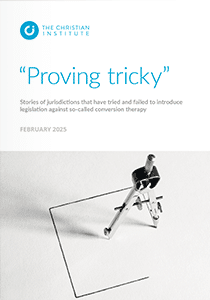The Christian Institute has reiterated its readiness to take legal action against the Westminster Government if it brings in a ‘conversion therapy’ Bill that impacts everyday religious practice.
The announcement comes in response to press speculation that the Government is to move ahead with a draft Bill banning ‘conversion practices’. LGBT activists have been calling for a law covering preaching, prayer, pastoral conversations and even parenting.
After repeated delays to the draft Bill’s publication, many commentators had predicted that the Prime Minister would drop the highly controversial plans, but the Institute reminded its supporters that a previous move to ditch the Bill had been thwarted by pro-ban activists.
‘Dangerous territory’
If a draft Bill is published, the Institute will take advice from a KC on whether it fulfils the Government’s pledge not to criminalise innocent conversations.
In 2021, leading human rights lawyer Jason Coppel KC told the Institute that a broad ban “would be likely to violate” the rights of Christians to express their sincerely held religious belief.They want a kind of LGBT blasphemy law.
Today, the Institute’s Deputy Director for Public Affairs Simon Calvert has again warned Westminster against trampling over religious freedom.
He said: “By moving ahead with this Bill at all, the Government is wading into very dangerous territory. Gay and trans people are already protected, quite rightly, from verbal and physical abuse by existing law. Since those things are outlawed, what is it that this Bill will seek to criminalise?”
LGBT ‘blasphemy law’
Mr Calvert highlighted activists’ demands, saying: “The leading activists on this issue – those the Government is trying to placate – are quite clear that they want it to target conversations and ideas they don’t like.
“They want a kind of LGBT blasphemy law. This is profoundly illiberal.”
“Jayne Ozanne says she wants ‘gentle non-coercive prayer’ to be criminalised as part of this Bill. But it is obvious to most people that gentle non-coercive prayer is not conversion therapy.”
Ciarán Kelly speaks to CI News about a possible draft Bill
‘Re-educating’ church leaders
Ozanne has also called on the Government to imitate the conversion therapy legislation in the Australian state of Victoria, where guidance states that parents who do not consent to their children going on puberty blockers are committing unlawful conversion therapy.
Read our briefing on the Victoria law
Religious leaders are told they are likely to be carrying out an illegal act if they tell people “that their gender identity is not real”, if they say prayers that “ask for a person to not act on their attractions” or “talk about a person’s brokenness or need to repent”.
The penalty in Victoria is up to ten years in prison or a maximum fine of over £100,000, and the state has already begun a programme of ‘re-educating’ church leaders.
Activists have called the state of Victoria’s ban “the gold standard”. In August, the Institute wrote to the Prime Minister saying that Australia’s ‘conversion therapy’ debacle should serve as a warning against pursuing a ban in the UK.
Unnecessary
Mr Calvert continued: “MPs and Peers scrutinising the draft conversion practices Bill must ensure that it does not even come close to imitating the terrible mistakes being made in Victoria.
“We know from leaked UK Government documents that no evidence has been presented of abuse or coercion that is not already illegal. This is key.
“In Sweden, an official Government report concluded there was no need for a conversion therapy ban because, as in the UK, existing criminal laws already protect gay and trans people from verbal and physical abuse. It warns against legislating merely to ‘send a signal’.”
In March 2022, the Government admitted in leaked documents that new UK legislation is unnecessary because LGBT people are fully protected from abuse under existing law, and that “the evidence-base for further legislative measures on conversion therapy is weak”.
Unwanted
According to a recent poll commissioned by the Institute, 96 per cent of voters did not regard a new law banning ‘conversion therapy’ as a priority.
Pollsters Whitestone Insight asked 2,091 UK voters to select their top five policy priorities for the coming twelve months, with a ‘conversion therapy’ law ranking 22 out of a list of 23 possible options.


